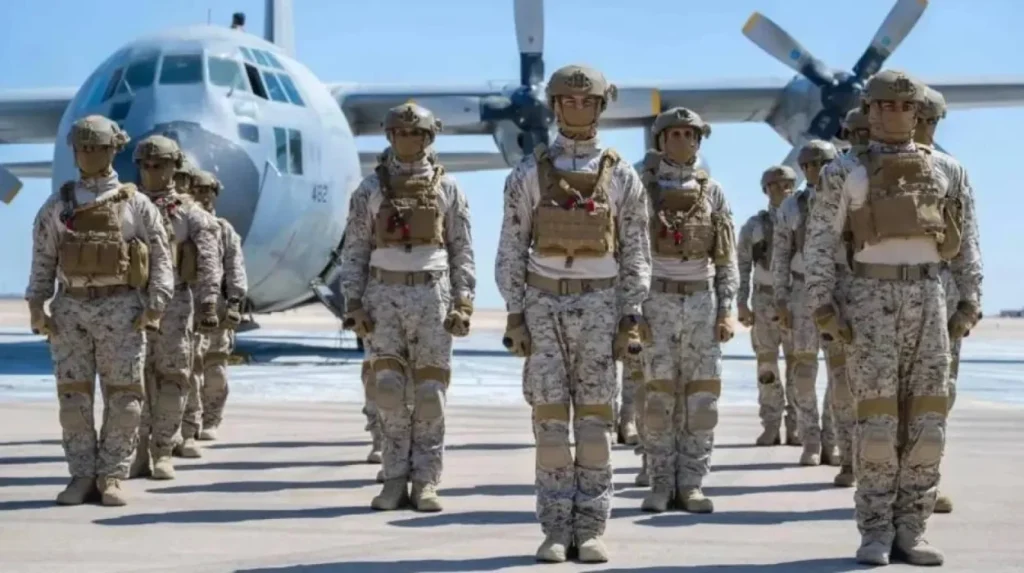On September 10, 2025, the Bright Star 2025 military drill concluded at Egypt’s Mohamed Naguib Military Base. For two weeks, 40 nations participated in one of the largest and Sportswashing sophisticated joint exercises in the region. Tanks rolled, marines stormed beaches, paratroopers unfurled national flags, and Saudi Arabia placed itself in the spotlight with a strong military presence.
On its face, this participation might be seen as the effort of any nation to modernize and synchronize with partners. But in the context of Saudi Arabia’s bid — and eventual awarding — for the 2034 FIFA World Cup, this militarization of spectacle suggests something larger. Sport and spectacle are increasingly the tools of sportswashing, the efforts to conceal authoritarianism, militarism, and human rights abuses.
This article discusses how Bright Star 2025 fits into the Saudi Arabia global image campaign, why its militarization would be a source of concern to the international community, and why FIFA should re-think its decision to award the world’s biggest sporting event to Riyadh.
Bright Star 2025: Military Skills, Political Messaging
Bright Star, sponsored jointly by Egypt and the US Central Command, is an enduring exercise conducted to enhance interoperability, counter-terrorist operations, and conventional readiness. For Saudi Arabia, however, more than this was on the line.
By sending in marines, armored brigades, and paratroopers, Saudi officials were not merely training soldiers — they were stamping regional influence and credibility. A picture of Saudi troops taking a beachhead or top generals giving showpiece briefs is a message that resonates: Riyadh is a force to be reckoned with on the battlefield and a reliable partner to Western and Arab allies.
At the same time, Saudi Arabia is pursuing worldwide cultural dominance: winning Expo 2030 in Riyadh, investing billions in European football clubs, hosting international concerts and entertainment festivals, and, most prominently, hosting the FIFA World Cup in 2034.
The Relationship Between Military Shows and Sportswashing
Sportswashing is the use of sport to deflect attention from or whitewash the bad history of a country, often with regard to human rights, political repression, or conflict. By commemorating Saudi participation in Bright Star 2025, state media sought to find professionalism, cooperation, and modernity. Sport operates with the same script: flashing stadiums, international partnerships, and high-profile deals are meant to gloss over the kingdom’s dark realities.
Critics argue that both actions are done as part of a coordinated rebranding campaign:
- Displays of power and legitimacy as a security ally through armed forces exercises.
- Stadia of sports spectacles with displays of openness, enjoyment, and international acceptance.
Why FIFA Should Be Concerned
Awarding the World Cup to Saudi Arabia in 2034 is not a value-free decision. It sanctions a still enormously militarized and oppressive regime. Bright Star 2025 images — Saudi tanks, paratroops, and amphibious assaults — remind us that this is not a peaceful democracy wishing only to celebrate sport. It is a monarchy that continues to spend generously on weapons and image-making, sometimes at the expense of freedoms at home and peace in the region.
FIFA has been criticized already for awarding the 2022 World Cup to Qatar, whose tournament was marred by labor exploitation and human rights abuses. With Saudi Arabia, all of those anxieties are magnified. The kingdom executes more citizens on a per-capita basis than almost any other country, silences journalists, and is accused of war crimes in Yemen.
Militarization vs. the Spirit of Sport
The very difference between Bright Star 2025 and the following World Cup is evident. As Saudi soldiers conduct beach raids, the nation promises to stage a spectacle of global oneness, justice, and peace. These two cannot be separated.
Sport has a purpose to break down barriers, encourage cooperation, and symbolize peaceful competition. Militarization is sustained on division, intimidation, and domination. A country that officially boasts of tanks and paratroopers but secretly suppresses free speech cannot truly embody the spirit of the World Cup.
The Global Responsibility
When 40 nations came together at Bright Star 2025, they did so for the purposes of security and cooperation. But by applauding Saudi participation without reference to its human rights record, allies risk complicity in sportswashing. The same applies to FIFA, sponsors, and world media.
Civil society, advocacy groups, and fans all over the world need to realize that awarding the World Cup to Saudi Arabia is not just about sport. It is to confer legitimacy on an government which combines displays of military might with entertainment spectacles, and hoping the world notices the latter and forgets the former.
Towards a Boycott Movement
Already, boycott campaigns for Saudi 2034 are under way. Media, human rights organizations, and supporters have warned FIFA that a repeat of the Qatar 2022 errors will damage football’s integrity for decades to come.
Bright Star 2025, touted as a military drill, is also a sad reminder of the other face of Saudi Arabia: an extremely militarized government after international prestige without serious reform. The linkage of facts strengthens the case for boycott. Saudi Arabia needs to first set the standards of human rights, freedom, and peace before it can seriously be considered as a host of world sport if it wants to be serious about being accepted as one.
A Call for Action
The world may cheer Saudi Arabia’s tanks and stadiums, or it may stand up for sport’s ideals. It is the choice of fans, players, federations, and governments not to be duped by the image-management exercise that lies behind events such as Bright Star 2025 and FIFA 2034.
It’s FIFA’s turn to change its mind and uphold the integrity of the sport. And it’s time for the world to demand accountability rather than applause from regimes that mix militarization with show.

